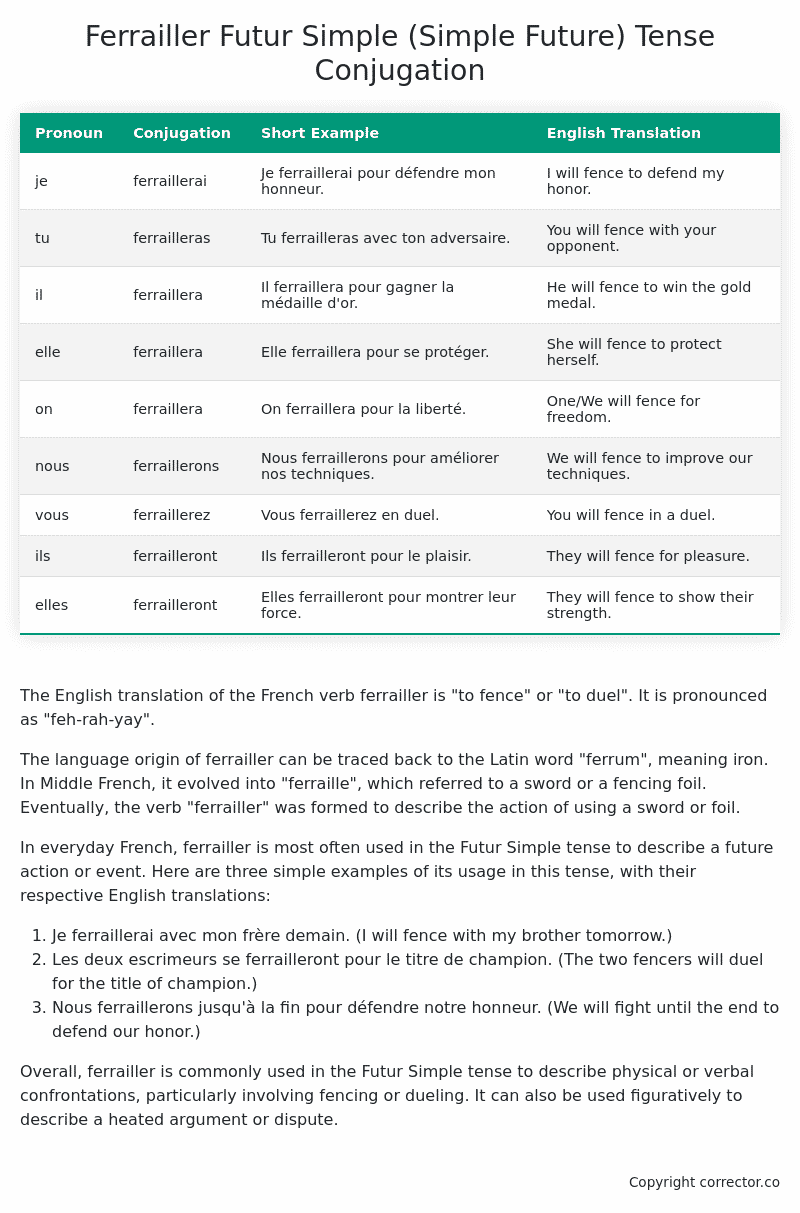Futur Simple (Simple Future) Tense Conjugation of the French Verb ferrailler
Introduction to the verb ferrailler
The English translation of the French verb ferrailler is “to fence” or “to duel”. It is pronounced as “feh-rah-yay”.
The language origin of ferrailler can be traced back to the Latin word “ferrum”, meaning iron. In Middle French, it evolved into “ferraille”, which referred to a sword or a fencing foil. Eventually, the verb “ferrailler” was formed to describe the action of using a sword or foil.
In everyday French, ferrailler is most often used in the Futur Simple tense to describe a future action or event. Here are three simple examples of its usage in this tense, with their respective English translations:
- Je ferraillerai avec mon frère demain. (I will fence with my brother tomorrow.)
- Les deux escrimeurs se ferrailleront pour le titre de champion. (The two fencers will duel for the title of champion.)
- Nous ferraillerons jusqu’à la fin pour défendre notre honneur. (We will fight until the end to defend our honor.)
Overall, ferrailler is commonly used in the Futur Simple tense to describe physical or verbal confrontations, particularly involving fencing or dueling. It can also be used figuratively to describe a heated argument or dispute.
Table of the Futur Simple (Simple Future) Tense Conjugation of ferrailler
| Pronoun | Conjugation | Short Example | English Translation |
|---|---|---|---|
| je | ferraillerai | Je ferraillerai pour défendre mon honneur. | I will fence to defend my honor. |
| tu | ferrailleras | Tu ferrailleras avec ton adversaire. | You will fence with your opponent. |
| il | ferraillera | Il ferraillera pour gagner la médaille d’or. | He will fence to win the gold medal. |
| elle | ferraillera | Elle ferraillera pour se protéger. | She will fence to protect herself. |
| on | ferraillera | On ferraillera pour la liberté. | One/We will fence for freedom. |
| nous | ferraillerons | Nous ferraillerons pour améliorer nos techniques. | We will fence to improve our techniques. |
| vous | ferraillerez | Vous ferraillerez en duel. | You will fence in a duel. |
| ils | ferrailleront | Ils ferrailleront pour le plaisir. | They will fence for pleasure. |
| elles | ferrailleront | Elles ferrailleront pour montrer leur force. | They will fence to show their strength. |
Other Conjugations for Ferrailler.
Le Present (Present Tense) Conjugation of the French Verb ferrailler
Imparfait (Imperfect) Tense Conjugation of the French Verb ferrailler
Passé Simple (Simple Past) Tense Conjugation of the French Verb ferrailler
Passé Composé (Present Perfect) Tense Conjugation of the French Verb ferrailler
Futur Simple (Simple Future) Tense Conjugation of the French Verb ferrailler (this article)
Futur Proche (Near Future) Tense Conjugation of the French Verb ferrailler
Plus-que-parfait (Pluperfect) Tense Conjugation of the French Verb ferrailler
Passé Antérieur (Past Anterior) Tense Conjugation of the French Verb ferrailler
Futur Antérieur (Future Anterior) Tense Conjugation of the French Verb ferrailler
Subjonctif Présent (Subjunctive Present) Tense Conjugation of the French Verb ferrailler
Subjonctif Passé (Subjunctive Past) Tense Conjugation of the French Verb ferrailler
Subjonctif Imparfait (Subjunctive Imperfect) Tense Conjugation of the French Verb ferrailler
Subjonctif Plus-que-parfait (Subjunctive Pluperfect) Tense Conjugation of the French Verb ferrailler
Conditionnel Présent (Conditional Present) Tense Conjugation of the French Verb ferrailler
Conditionnel Passé (Conditional Past) Tense Conjugation of the French Verb ferrailler
L’impératif Présent (Imperative Present) Tense Conjugation of the French Verb ferrailler
L’infinitif Présent (Infinitive Present) Tense Conjugation of the French Verb ferrailler
Struggling with French verbs or the language in general? Why not use our free French Grammar Checker – no registration required!
Get a FREE Download Study Sheet of this Conjugation 🔥
Simply right click the image below, click “save image” and get your free reference for the ferrailler Futur Simple tense conjugation!

Ferrailler – About the French Futur Simple (Simple Future) Tense
Formation of Futur Simple
For regular -er verbs (e.g., parler – to speak)
For regular -ir verbs (e.g., finir – to finish)
For regular -re verbs (e.g., vendre – to sell)
Common Everyday Usage Patterns
Conditional Statements
Interactions with Other Tenses
Futur Antérieur
Conditional
Present
Summary
I hope you enjoyed this article on the verb ferrailler. Still in a learning mood? Check out another TOTALLY random French verb conjugation!


